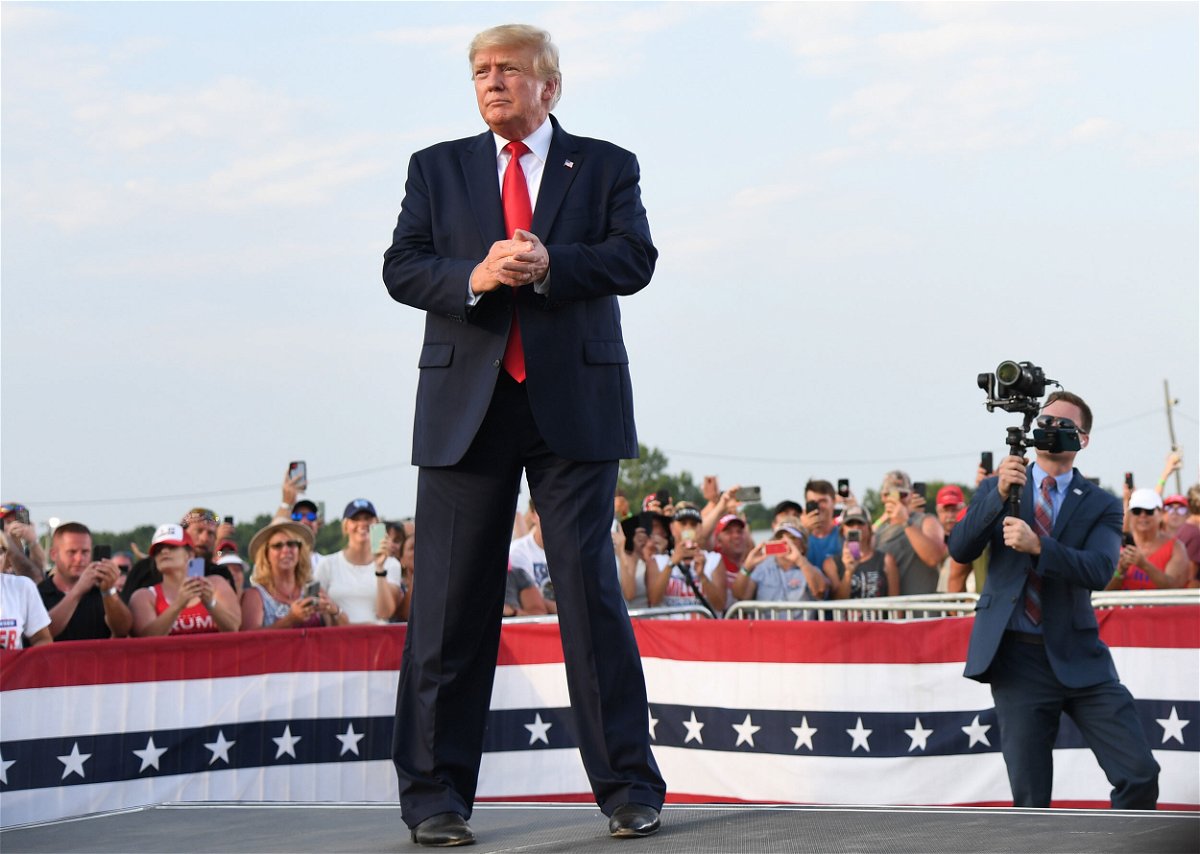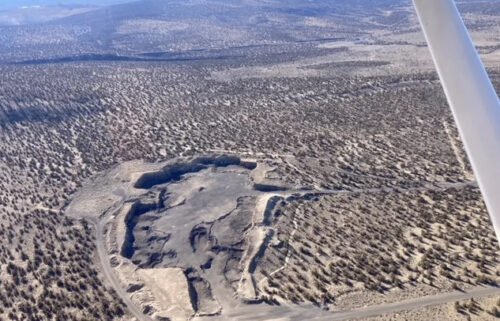Revisiting Trump’s long history of trying to influence witnesses

Members of the House select committee investigating January 6
By Marshall Cohen, CNN
Members of the House select committee investigating January 6, 2021, went public this week with allegations that former President Donald Trump and his allies are trying to influence witnesses with potential intimidation tactics intended to keep them in line.
GOP Rep. Liz Cheney, the panel’s vice chair, described a pattern of potential witness tampering that “raises significant concern.” At Tuesday’s hearing, the Wyoming Republican read snippets of private depositions, without revealing the names of the witnesses, that she said fit the pattern.
She said one witness told the panel that Trump allies told them they’ll “continue to stay in good graces in Trump world” as long as “I’m protecting who I need to protect.” Another witness said they were told that Trump was “thinking about you” and that “he knows you’re loyal” and hopes that “you’re going to do the right thing” — and that he’ll be reading deposition transcripts.
CNN reported Thursday that former Trump White House aide Cassidy Hutchinson — the star witness from this week’s committee hearing — was one of the two people who received this outreach.
Democratic Rep. Adam Schiff of California, a member of the committee, told CNN that “we’ve seen a history of the former President trying to influence witnesses or intimidate them.” When asked by The Washington Post about the revelations from Tuesday’s hearing, Rep. Jamie Raskin, a Maryland Democrat on the committee, said “witness tampering is a federal crime.”
If the committee believes witness tampering has occurred, it can send criminal referrals to the Justice Department for further investigation. (To be clear, Trump has never been charged with any crimes, including witness tampering.)
But Michael Zeldin, a former federal prosecutor, said the evidence presented so far by the committee is strong enough to warrant an investigation.
“I don’t know who said them and what context in which they were said — and that matters,” Zeldin said. “But if you look at the black letter of the quotes, those are very threatening words. There is probable cause to believe those words were intended to influence the testimony of a witness. Whether they were chargeable witness tampering, that depends on the context.”
Trump has a history of using his position to threaten, discredit or cajole potential witnesses. Here’s a breakdown of a dozen examples dating back to special counsel Robert Mueller’s investigation and Trump’s first impeachment:
Paul Manafort
Trump’s 2016 campaign chairman Paul Manafort and his deputy Rick Gates were charged by Mueller in late 2017. After their indictment, Manafort told Gates that he had spoken with Trump’s personal lawyer and they were “going to take care of us,” according to the Mueller report.
Within months, Gates pleaded guilty and became a key Mueller cooperator. But Manafort maintained his innocence and took his case to trial. Throughout Manafort’s legal case, Trump publicly criticized the prosecutors, praised Manafort, and dangled the possibility of a pardon.
Mueller concluded that Trump’s actions “intended to encourage Manafort not to cooperate” and were also an attempt to influence the jury. Manafort was convicted at trial and then pleaded guilty in a second case. He briefly agreed to cooperate with Mueller but repeatedly lied during his interviews. Manafort went to prison for tax and bank fraud, and Trump pardoned him in 2020.
Michael Cohen
Trump’s conduct toward his former lawyer, Michael Cohen, was also scrutinized by Mueller.
After the FBI raided Cohen’s home and office, Trump publicly defended him and said he didn’t think Cohen would “flip.” A lawyer close to Trump attorney Rudy Giuliani emailed Cohen saying that he should “sleep well” because “you have friends in high places.” Cohen told investigators that another Trump lawyer had said he’d be fine, and maybe get a pardon, if he stayed on message.
But after Cohen started turning against him, Trump used “attacks and intimidation” to deter Cohen from testifying, which “could” have qualified as obstruction, Mueller said. This included public threats against Cohen’s family that Mueller said were at least partially meant to “discourage” Cohen from cooperating because Cohen might implicate him in wrongdoing.
Cohen served part of a three-year prison term for tax fraud and campaign finance crimes, before being released on house arrest in 2020, amid concerns about the Covid-19 pandemic.
Roger Stone
Mueller investigated whether Trump obstructed the probe into Roger Stone, a longtime friend who advised his 2016 campaign, and was indicted for lying to Congress and witness tampering. Trump said Stone was “brave” for not “flipping” and suggested that a pardon was warranted.
“These statements, as well as those complimenting Stone and Manafort while disparaging Michael Cohen once Cohen chose to cooperate, support the inference that the President intended to communicate a message that witnesses could be rewarded for refusing to provide testimony adverse to the President and disparaged if they chose to cooperate,” Mueller said.
All the while, Stone said he would never testify against Trump. He was convicted on all charges, but Trump commuted Stone’s three-year prison term and pardoned him before leaving office.
Michael Flynn
A Trump lawyer left a voicemail for the lawyer representing Michael Flynn, Trump’s first national security adviser, on the eve of Flynn’s decision to plead guilty and cooperate with Mueller. Mueller scrutinized the voicemail as potential obstruction by Trump, because his attorney seemed to suggest that Flynn could stay in Trump’s good graces if he stayed friendly with Trump’s team.
“If … there’s information that implicates the President, then we’ve got a national security issue … not only for the President, but for the country,” Trump lawyer John Dowd said. “You know, we need some kind of heads up, just for the sake of protecting all our interests… Remember what we’ve always said about the President and his feelings toward Flynn and that still remains.”
The Mueller report concluded that the “sequence of events could have had the potential to affect Flynn’s decision to cooperate, as well as the extent of that cooperation.”
Flynn cooperated extensively with Mueller, but before his sentencing, he hired pro-Trump lawyers and tried to withdraw his guilty plea. Trump pardoned Flynn in December 2020.
Don McGahn
Trump once ordered his White House Counsel Don McGahn to publicly lie about his efforts to fire Mueller. Federal prosecutors concluded that there was “substantial evidence” that this incident was obstruction of justice, because McGahn was a key witness against Trump, who later gave firsthand testimony about how Trump handled the Russia probe.
James Comey
After Trump fired FBI Director James Comey in 2017, he tweeted a threat, saying Comey “better hope that there are no tapes of our conversations before he starts leaking to the press!” Comey later said this inspired him to disclose details of his meetings with Trump, in hopes of triggering an investigation. Comey’s firing was investigated by Mueller as potential obstruction of justice.
John Bolton
Trump lashed out at former national security adviser John Bolton in 2019, after Bolton revealed damning revelations in his book about Trump’s attempts to solicit political favors from Ukraine. Trump publicly accused Bolton of divulging “classified national security” secrets in his memoir, accused Bolton of lying, and repeatedly said that he believed Bolton should be prosecuted.
The Trump-era Justice Department soon did exactly what Trump called for — investigators launched a criminal probe and filed a lawsuit seeking to block Bolton’s book from publication. Bolton claimed he was being politically targeted. The lawsuit and probe were dropped in 2021.
Marie Yovanovitch
Trump tweeted personal attacks against Marie Yovanovitch, the former US ambassador to Ukraine, while she testified to Congress during his first impeachment about her untimely ouster from Kyiv. She said the tweets were “very intimidating.” At Trump’s impeachment trial, the House Democratic impeachment managers said this was part of his “campaign of witness intimidation.”
The Ukraine whistleblower
Throughout Trump’s first impeachment, he publicly threatened “the whistleblower,” the US intelligence official who filed the original complaint about Trump’s politicized dealings with Ukraine. Trump goaded the press to reveal the whistleblower’s identity, and said they were “close to a spy” who should be tried for treason, which is punishable by the death penalty.
The still-unidentified whistleblower’s lawyers said these comments put their client in danger.
Other impeachment witnesses
After Trump was acquitted at his first Senate trial, he quickly retaliated against some of the key players who cooperated with the House Democrats’ inquiry or publicly testified against him.
He dismissed Lt. Col. Alexander Vindman from his position as the top Ukraine expert at the National Security Council. Trump also dismissed Vindman’s brother, who was also a National Security Council staffer, even though he had nothing to do with the impeachment proceedings.
Trump also fired Gordon Sondland, the US ambassador to the European Union. Sondland and Vindman directly implicated Trump in the pressure campaign to have Ukrainian President Volodymyr Zelensky announce that then-candidate Joe Biden was under investigation for corruption.
After he was acquitted, Trump also fired Michael Atkinson, the intelligence community inspector general who passed along the original whistleblower complaint to Congress, as required by law.
The-CNN-Wire
™ & © 2022 Cable News Network, Inc., a WarnerMedia Company. All rights reserved.



